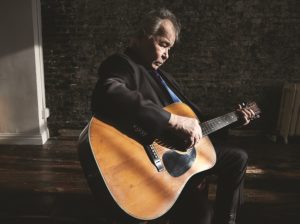On April 7, America lost singer-songwriter John Prine to Covid-19. He was a giant in the world of country and folk music — genres that, it may surprise some to know, resonated deeply on the Outer Cape. So did Prine. Maybe that’s because he was, deep down, a poet. On April 14, Fred Boak hosted a tribute to him on WOMR.
Prine often grappled with death in his lyrics, usually with a heavy dose of humor. On the final song of his most recent album, 2018’s The Tree of Forgiveness, Prine, who had survived two bouts of cancer, sings with ironic good cheer about shaking God’s hand in heaven and smoking a nine-mile-long cigarette.
Jim Rohrer, a Wellfleetian and lifelong mandolin player, recalls meeting Prine backstage after a performance in 1973. It was Rohrer’s senior year of high school, and a friend who was fanatic about Prine’s self-titled 1971 debut album persuaded Rohrer to hitchhike with him from New York City to Buffalo for a folk festival where Prine was playing.
“We saw his concerts at the festival,” says Rohrer, “and then we were walking down some hallway and there’s John Prine, sitting on the floor. So, we sat down with him, and we talked to him about his music. He shared his whiskey with us, and we shared our cigarettes with him.”

Rohrer, who became a professional touring bluegrass musician in the late ’80s and early ’90s, says that Prine’s music stayed with him. And not only him — some of Prine’s tunes have become bluegrass standards, such as “Paradise,” from that debut album. Rohrer also recalls reading somewhere that Prine would tune his guitar’s B string a little flat to “make it sound more lonesome.”
“Ever since I read that,” says Rohrer, “whenever I tune my guitar, I do that, too.”
Prine claimed not to care much about politics. But one of his earliest songs, “Your Flag Decal Won’t Get You Into Heaven Anymore,” a Vietnam War lament, rang true to a new generation of listeners some 40 years later during the war in Iraq.
A younger generation of musicians on the Cape has also been influenced by Prine. Alex Brewer, a country-folk songwriter who lives in Wellfleet and hosts Feed Your Love, the monthly open mic night at Preservation Hall, says he really got into Prine’s music in 2010. His favorite thing about Prine was his emotional range. “He was super-serious at times and funny, too,” says Brewer. “His range is as wide as anybody’s.”
It was partly this range and sensitivity that Brewer recalls being influential for him when, eight years ago, he was trying to write a song about someone he’d known who had committed suicide. He asked himself, “What would John Prine say?” Who else was better at giving difficult emotions a gentle twist?
Brewer, who studied English at Colgate, compares Prine to the New England poet Robert Frost, in that they both possess a certain restraint in their writing — they both valued saying “enough” of the truth and not going overboard into sentimentality.
Monica Rizzio, who grew up in East Texas and now lives in Yarmouth Port, was also aided by Prine in her songwriting. In 2007, after joining the Cape-based band Tripping Lily, Rizzio met Prine at a gig in Cambridge. “He was very, very humble,” she says. The title song on her most recent album, Sunshine Is Free, was consciously written in Prine’s style. Rizzio says she tried to capture his upbeat side and his silliness, and was overjoyed when critics picked up on this, calling it her “John Prine-ish tune.”
Those of us who are heartbroken at Prine’s death can take solace in the fact that local musicians such as Rohrer, Brewer, and Rizzio are keeping him in mind when they tune their guitars and pen their lyrics. In one of his many morbidly comic songs, 1973’s “Please Don’t Bury Me,” Prine almost seems to predict that we’d keep him around after death:
“Please don’t bury me/ Down in the cold cold ground,” he writes. “No I’d druther have ’em cut me up/ And pass me all around/ Throw my brain in a hurricane/ The blind can have my eyes/ And the deaf can take both my ears/ If they don’t mind the size.”



